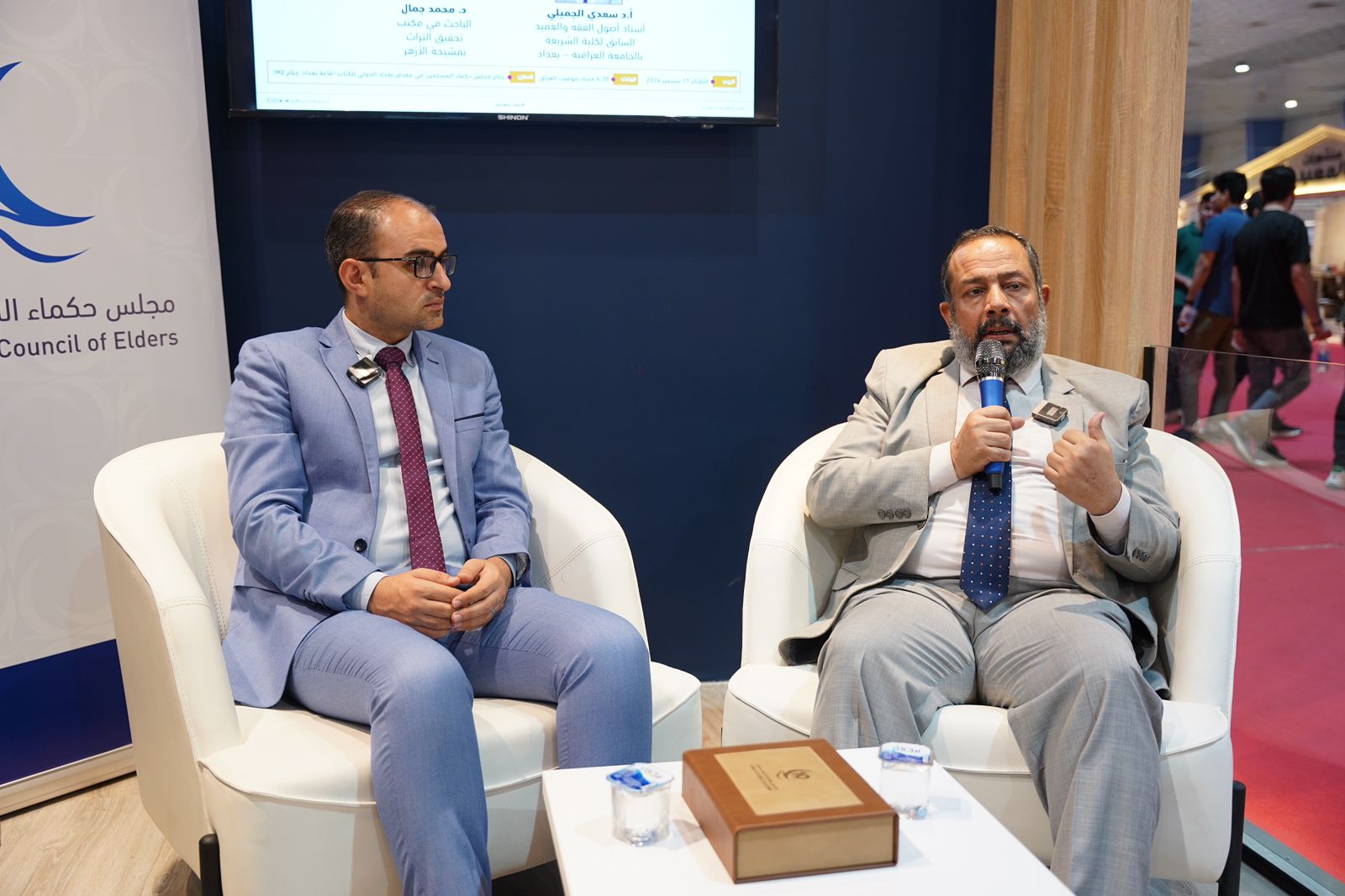Intra-Islamic Dialogue from a Sharia Perspective in a Seminar at the Muslim Council of Elders' Pavilion at the Baghdad International Book Fair
Former Dean of the College of Sharia at the Iraqi University: The call made by the Grand Imam of Al-Azhar for Muslim unity carries a sincere vision and an enlightened approach to enhancing intra-Islamic dialogue
Researcher at the Heritage Revival Office at Al-Azhar: The Islamic Ummah urgently needs to reunite and unify its ranks to restore its former glory and highlight the ideal image of the Islamic society
The Muslim Council of Elders' pavilion at the 25th edition of the Baghdad International Book Fair organized a seminar titled "Intra-Islamic Dialogue in Light of the Objectives of Sharia." The seminar was presented by Professor Saadi Al-Jumaili, Professor of Usul al-Fiqh and former Dean of the College of Sharia at the Iraqi University, Baghdad, and Dr. Mohamed Jamal, researcher at the Heritage Revival Office at Al-Azhar. The discussion focused on enhancing intra-Islamic dialogue between various sects and schools of thought from a Sharia perspective, aiming to serve the public interest, prevent harm, and preserve religion, life, intellect, honor, and wealth, while highlighting the commonalities that unite Muslims for the benefit of the Ummah.
Professor Saadi Al-Jumaili expressed his appreciation for the call made by His Eminence Dr. Ahmed Al-Tayeb, Grand Imam of Al-Azhar and Chairman of the Muslim Council of Elders, to promote intra-Islamic dialogue. He emphasized that this call seeks to strengthen the Islamic cause, unify the ranks of the Ummah, and reaffirm that religious fraternity is the foundation of human fraternity. This call also reflects a sincere vision for Muslim unity and a progressive approach to fostering dialogue between various Islamic sects and schools of thought. Al-Jumaili noted that this call is both timely and essential, particularly given the major challenges currently facing the Islamic world.
The Professor of Usul al-Fiqh and former Dean of the College of Sharia at the Iraqi University explained that intra-Islamic dialogue must be rooted in the objectives of Islamic Sharia, which form the foundation of unity within the Ummah. He highlighted that the most important objectives are justice and equality, as these are the pillars of any successful and meaningful dialogue. Unity within the Ummah cannot be achieved unless every individual feels they are treated with fairness and equality. He also pointed out that freedom, in belief, opinion, and expression, is a primary objective of Islamic Sharia. Islam guarantees these freedoms not only to its followers but also to adherents of other religions—so how much more so should they apply within the Ummah itself.
Professor Saadi Al-Jumaili also called on all Muslims to earnestly work toward uniting their ranks, adhering to the objectives of Islamic Sharia that bind them, and abandoning the sectarian divisions that have weakened the Ummah. He emphasized the need to achieve the goals set by Sharia to ensure the Ummah’s continuity and prosperity. He affirmed that Islamic unity is not merely a dream, but a realistic goal that can be achieved through sincerity and collective effort to create a better future for the Islamic nation and its current and future generations.
Dr. Mohamed Jamal, for his part, stressed the urgent need for the Islamic Ummah to reunite, heal divisions, and unify its ranks and voice. This will help restore the Ummah’s former glory and showcase the ideal image of an Islamic society, one built on the values of mercy, tolerance, understanding, and coexistence. He pointed out that the unity of the Islamic Ummah and its preservation in terms of religion, intellect, life, honor, and wealth is a clear mandate established by Islamic legislation, as evidenced by both the Quran and the prophetic Sunnah.
The Muslim Council of Elders is participating for the first time at the Baghdad International Book Fair, in line with its mission to promote peace, foster dialogue and tolerance, and build bridges of coexistence among people of different races and beliefs. The pavilion, located in Baghdad Hall (Pavilion H2), showcases over 220 publications in five languages, including 24 new releases that address significant intellectual and cultural topics. Additionally, the pavilion is hosting a series of seminars and lectures featuring prominent thinkers, scholars, and academics to discuss ways to enhance dialogue and understanding among Islamic sects and to build bridges of communication, aiming for greater cooperation and unity among the various components of the Islamic nation.

